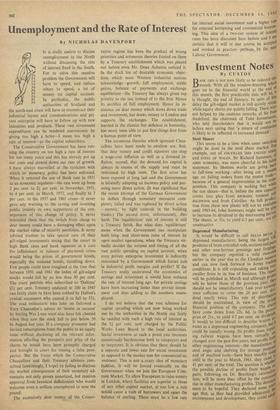Investment Notes
By CUSTOS
BA:vie rate is not now likely to be reduced tills month. With all the window-dressing $Fbic11, goes on in the financial world at the end 0' this month, the first practicable date will be, it is thought, the end of January. In spite of this delay the gilt-edged market is still quietly rising, while equity shares are quietly falling. These eler.e not helped by the cautious remarks of Sir Ivan Stedeford, the chairman of Tube Investments, who told shareholders that it would not be before next spring that 'a return of confidence is likely to be reflected in increased demand.'
Steel Shares
This seems to be a time when some switching might be done in the steel share market, For example, out of coevtuEs into UNITED sleet; and STEEL OF WALES. Sir Richard Summers, 1:4,. JOHN SUMMERS, was more cheerful in his lates; statement. Its Shotton works are going b5ctil to full-time working—after being cut aMon ago on falling orders from the motor trade' because of a general improvement in the ord.er position. This company is making hay wh,11„e the sun shines—that is, before the new capacir:a; Comes into play from RICHARD, THOMAS B ALDW INS and from Colvilles. As full product' tion from these new plants will not be availsiblee until 1963-64, John Summers might well be av to increase its dividend in the intervening Pericidt The shares, at 31s. to yield 6.3 per cent.. are 11 unattractive.
Depressed Manufacturing a It would be difficult to call DELTA METAL • depressed manufacturer, being the largest producer of brass extruded rods, sections and par" and other non-ferrous pressings and forgings..' but the company reported a mild recessioa earlier in the year due to the LIoydian sonee.°, and can now look forward to better trach117 conditions. It is still expanding and taking °Vert smaller firms in its line of business. The reP2ts will be published in March and although Prtv will be below those of the previous year, til"5 should not be unsatisfactory. Last year earndi,vingi, were sufficient to cover the 20 per cent. 0 dend nearly twice. This rate of distributic1tig should be maintained, in view of the st(0%.,.. financial position of the company. The sharr; have come down from 23s. 6d. to the PrescAs, price of 21s., to yield 4.7 per cent, on divideP6, It would be less difficult to describe WAGON 114 PAIRS as a depressed engineering companY, 11114- could be equally wrong. Its profits from reP—ri, ing railway wagons have been virtuallY 110 changed over the past five years, but profits fOof other engineering interests—the manufactul'e steel angle and shelving for storage purrsrig and of machine tools—have been steadily rislto until in the year to March, 1961, they cat-Ober 41 per cent. of the total. The question is wbet,e, the possible decline of profits from pairs, following on Dr. Beeching's rationall74 tion, will be more than offset by the contill.11 0 rise in other manufacturing profits. The dire,0 seem to be hopeful. They declared some Yeior ago that, as they had provided adequatelY, dt maintenance and development, they could aucIr


































 Previous page
Previous page